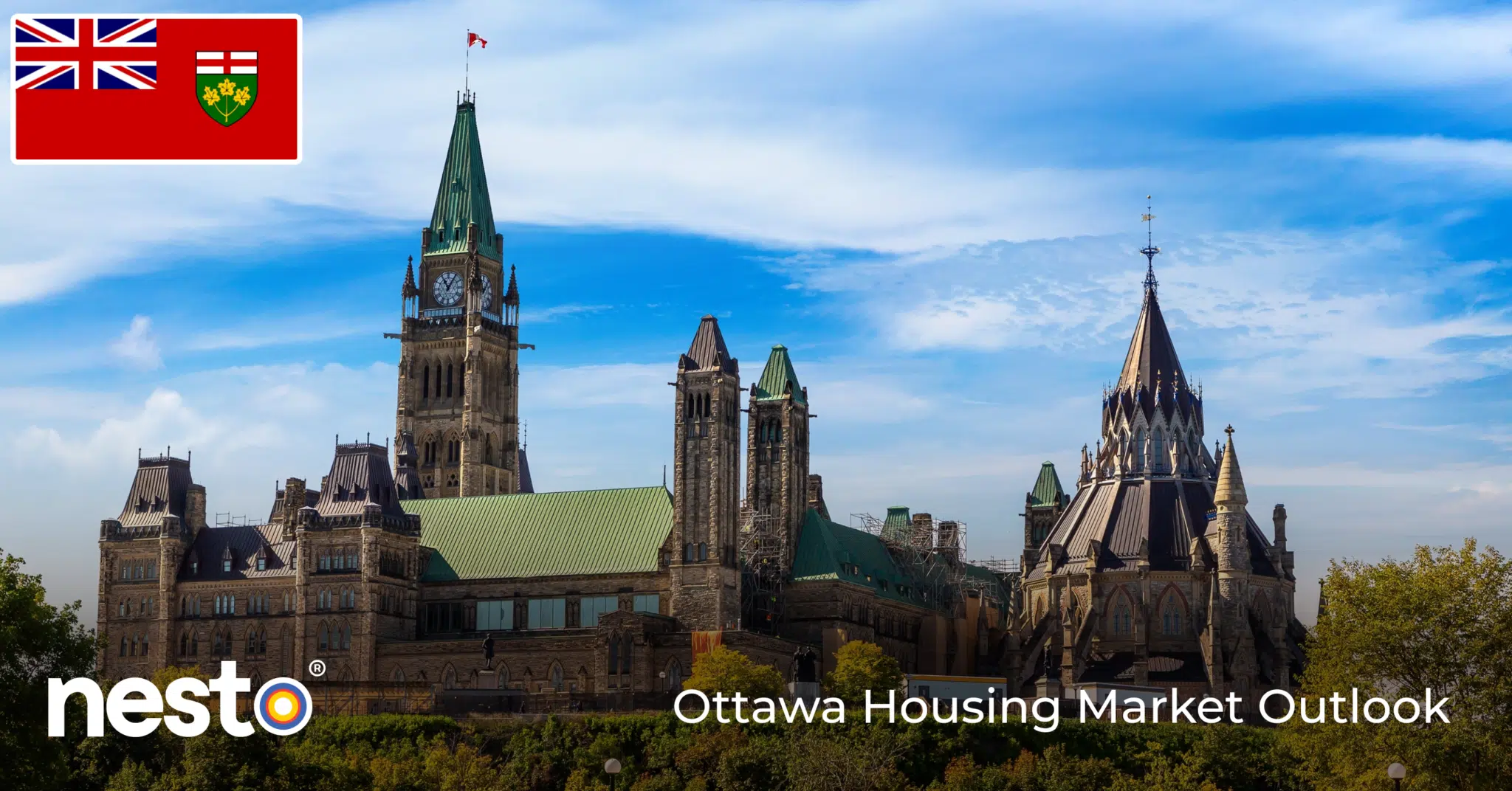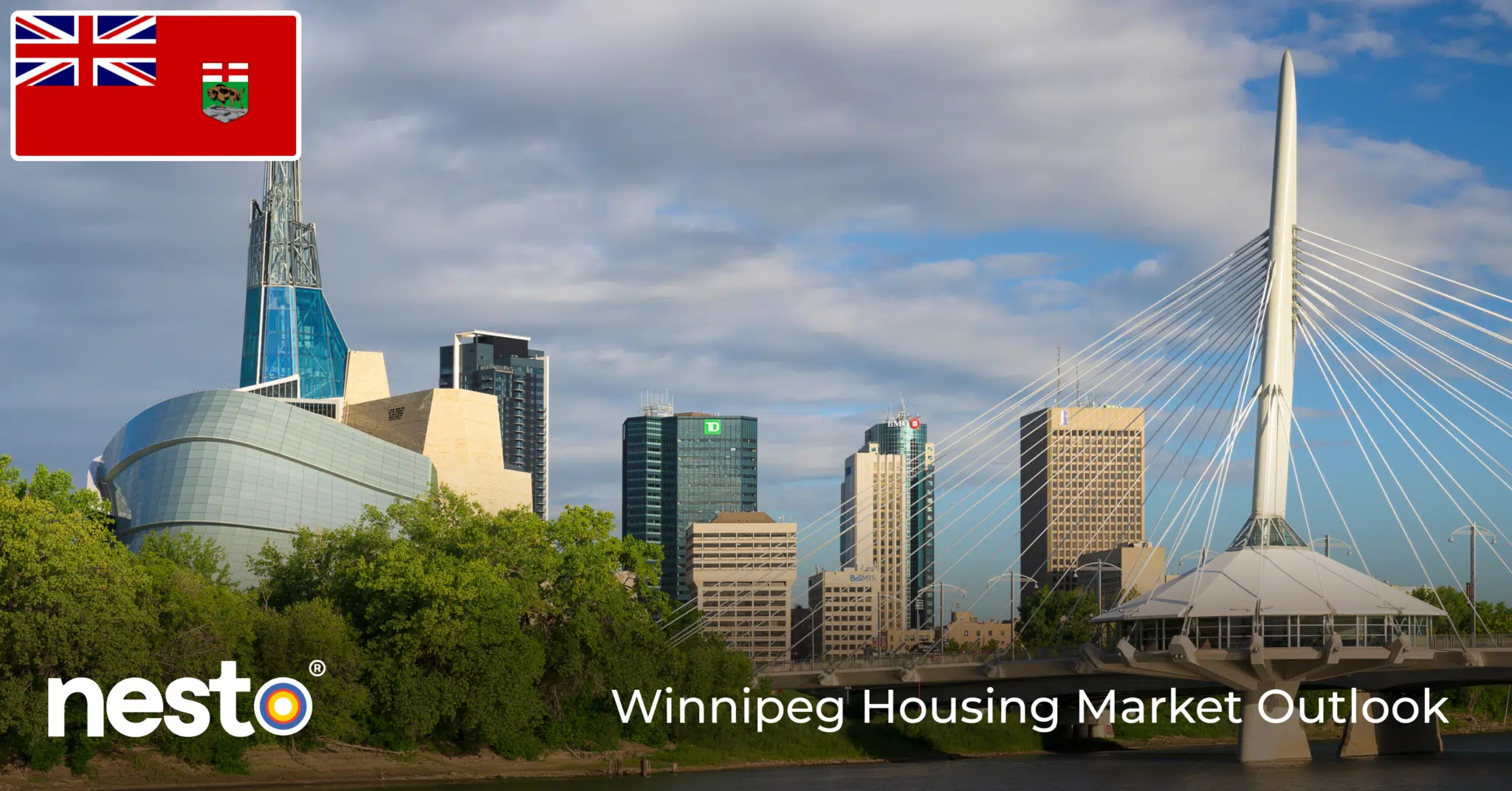Ottawa Housing Market Outlook 2026

Ottawa Home Prices Edge Lower as Inventory Climbs
Ottawa’s housing market began 2026 in balanced territory, with higher inventory levels giving buyers more negotiating room while price declines remained contained. January’s data indicate the market is adjusting gradually rather than deteriorating sharply.
Are Home Prices Falling in Ottawa?
Home prices are softening modestly across most property types, but the declines remain orderly. Ottawa’s composite benchmark sits slightly below last year’s level, and both detached homes and townhouses recorded moderate year-over-year decreases. Condo apartments experienced the most pronounced adjustment, reflecting greater sensitivity to investor pullback and affordability constraints.
This diverging pattern suggests that price changes are being driven by increased supply and more cautious buyer behaviour rather than distress selling. Detached homes continue to demonstrate relative stability compared to other segments.
Is Ottawa a Buyer’s or Seller’s Market?
Ottawa is operating in balanced conditions. Months of inventory reached 4.4 in January, close to long-term norms and significantly higher than the tight conditions seen during the pandemic.
A balanced market typically has 4 to 6 months of inventory. Current levels indicate that buyers have more choice and negotiating leverage than in recent years, but well-priced homes continue to attract interest.
Sales volumes declined compared to last year but remain consistent with historical January averages, suggesting demand has slowed but not disappeared.
Which Property Types in Ottawa Are Most Affected?
Market conditions in Ottawa vary by property type segment. Detached homes remain the most stable category, with inventory levels aligned with balanced conditions and relatively limited price movement.
Townhouses show rising supply and modest price adjustments, reflecting growing buyer caution in mid-range price tiers.
Condo apartments face the most pressure, with elevated months of inventory and sharper price declines. However, January data show improved absorption compared with late 2025, indicating the segment may be approaching stabilization.
What is Happening With New Construction and Supply in Ottawa?
Forecast data for Ottawa indicates that housing starts are expected to slow in 2026 after a strong 2025. Apartment construction is projected to decline, driven primarily by rising vacancy rates and softer investor demand.
Ground-oriented construction is expected to remain more stable, although high inventories of completed and unsold units may limit new starts.
Rental market conditions are also easing. Vacancy rates are forecast to rise further, and rent growth is expected to moderate. Slower population growth and a reduced inflow of international students and foreign workers are contributing factors.
What Should Buyers and Sellers in Ottawa Watch Next?
Buyers should monitor inventory trends and absorption rates, particularly in the condo segment. A continued rise in supply without a corresponding increase in demand could lead to further price softness.
Sellers should price strategically, as elevated inventory means overpricing leads to longer days on market.
If the Bank of Canada manages inflation expectations, bond markets could provide lower fixed rates, easing and stabilizing borrowing costs; this, in turn, could improve buyer confidence and support stronger activity during the spring market.
Ottawa Housing Market Highlights
- The average selling price of a home in Ottawa decreased by 1.9% year-over-year to $606,700 in January.
- The average selling price of a single-family home in Ottawa decreased by 11.3% year-over-year to $683,000 in January.
- The average selling price of a townhouse/multiplex in Ottawa decreased by 9.8% year-over-year to $553,700 in January.
- The average selling price of a condo in Ottawa decreased by 38% year-over-year to $380,600 in January.
- The average rent in Ottawa is now $2,127 for January.
- February 20, 2026: Today’s lowest mortgage rate in Ottawa is
for a 5-year fixed.
Data from the Ottawa Real Estate Board (OREB) indicates that the average price of resale residential homes sold across Ottawa in January was $606,700, and itdecreased of 1.9% compared to a year ago.
OREB also reported a sales-to-new-listings ratio (SNLR) of 40%, indicating Buyers market conditions in Ottawa for January.
Composite Home Prices
![]()
The average selling price of a home in Ottawa was $606,700 for the month of January, that’s decreased by 1.1% month over month. On a year-over-year basis, Ottawa home prices have decreased 1.9% year-over-year.
Single-family Home Prices
![]()
The average selling price of a single-family home in Ottawa was $683,000 for the month of January, that’s decreased by 1.7% month over month. On a year-over-year basis, single-family home prices in Ottawa have decreased by 11.3% year-over-year.
Townhouse and Multiplex Prices
![]()
The average selling price of a townhouse in Ottawa was $553,700 for the month of January, that’s increased by 1% month over month. On a year-over-year basis, the price of a townhouse in Ottawa has decreased by 9.8% year-over-year.
Condo Prices
![]()
The average selling price of a condo in Ottawa was $380,600 for the month of January, that’s decreased by 1.6% month over month. On a year-over-year basis, the price of a condo in Ottawa has decreased 38% year-over-year.
Transactions – Number of Sales
![]()
The number of sales in Ottawa was 610 during January, that’s decreased by 3.9% month over month. On a year-over-year basis, sales in Ottawa have decreased by 1.1% year-over-year.
New Listings
![]()
The number of new listings in Ottawa was 1,522 during January, that’s increased by 136.3% month over month. On a year-over-year basis, new listings in Ottawa have increased by 12% year-over-year.
Real Estate Market
![]()
The sales-to-new-listings ratio (SNLR) in Ottawa was 40% during January, indicating a Buyers. On a monthly basis, that’s decreased by 56% month over month. Ottawa’s year-over-year sales-to-new-listings ratio has decreased by 11.7% year-over-year.
The sales-to-new-listings ratio (SNLR) measures the number of home sales compared to new listings. An SNLR below 40% suggests a buyer’s market, where buyers have the upper hand and greater negotiating power. An SNLR between 40% and 60% is a balanced market, while an SNLR of over 60% is considered a seller’s market.
Annual Changes to Composite Home Prices in Ottawa
Ottawa Market Rents Snapshot
The average rent in Ottawa was $2,127 for the month of January.
The average rent for a 1-bedroom apartment in Ottawa was $1,945 for the month of January, which decreased by 4% year over year.
The average rent for a 2-bedroom apartment in Ottawa was $2,458 for the month of January, which decreased by 2.8% year over year.
Rental Price Changes by City
| Rank | CITY | Total Average | 1 Bedroom | 2 Bedrooms | Year-over-Year Change |
|---|---|---|---|---|---|
| 1 | North Vancouver | $2,958 | $2,469 | $3,287 | −2.2% |
| 2 | Vancouver | $2,650 | $2,362 | $3,279 | −4.8% |
| 3 | Oakville | $2,502 | $2,216 | $2,576 | −19.3% |
| 4 | Toronto | $2,504 | $2,183 | $2,801 | −8.6% |
| 5 | North York | $2,528 | $2,127 | $2,688 | −1.9% |
| 6 | Burnaby | $2,505 | $2,144 | $2,809 | −6.7% |
| 7 | Coquitlam | $2,524 | $2,107 | $2,765 | −3.9% |
| 8 | Mississauga | $2,446 | $2,043 | $2,454 | −8.6% |
| 9 | Etobicoke | $2,382 | $2,102 | $2,562 | −8.3% |
| 10 | Kanata | $2,412 | $2,238 | $2,502 | −17.3% |
| 11 | Brampton | $2,361 | $1,910 | $2,208 | −7.2% |
| 12 | Kingston | $2,315 | $1,968 | $2,502 | 22.0% |
| 13 | Scarborough | $2,318 | $1,910 | $2,417 | −5.6% |
| 14 | Vaughan | $2,266 | $2,082 | $2,499 | −6.7% |
| 15 | Greater Sudbury | $2,067 | $1,918 | $2,167 | −2.4% |
| 16 | Langley | $2,344 | $2,071 | $2,465 | −1.8% |
| 17 | Burlington | $2,376 | $2,065 | $2,443 | −5.0% |
| 18 | Ajax | $2,248 | $1,814 | $2,229 | −4.5% |
| 19 | Halifax | $2,270 | $2,052 | $2,500 | 0.10% |
| 20 | Victoria | $2,224 | $1,942 | $2,605 | −5.1% |
| 21 | Guelph | $2,159 | $1,979 | $2,291 | −4.0% |
| 22 | Kelowna | $2,015 | $1,686 | $2,124 | −10.8% |
| 23 | Surrey | $2,124 | $1,818 | $2,249 | −8.5% |
| 24 | Ottawa | $2,127 | $1,945 | $2,458 | −2.8% |
| 25 | New Westminster | $2,120 | $1,872 | $2,611 | −7.4% |
| 26 | Waterloo | $2,230 | $2,028 | $2,367 | −2.7% |
| 27 | Oshawa | $2,121 | $1,753 | $2,052 | −5.4% |
| 28 | Nanaimo | $2,055 | $1,820 | $2,328 | 8.20% |
| 29 | Barrie | $2,154 | $1,904 | $2,184 | −1.2% |
| 30 | East York | $2,302 | $1,963 | $2,554 | −4.3% |
| 31 | Hamilton | $2,069 | $1,753 | $2,086 | 0.40% |
| 32 | Brossard | $2,066 | $1,794 | $2,169 | 1.60% |
| 33 | Cambridge | $2,057 | $1,797 | $2,101 | −6.4% |
| 34 | Kamloops | $1,992 | $1,805 | $2,161 | 5.60% |
| 35 | Airdrie | $1,954 | $1,450 | $1,739 | −0.9% |
| 36 | Laval | $2,098 | $1,710 | $2,348 | 11.00% |
| 37 | Kitchener | $2,013 | $1,819 | $2,130 | −4.5% |
| 38 | Brantford | $1,979 | $1,802 | $2,058 | 0.50% |
| 39 | Niagara Falls | $1,929 | $1,684 | $1,899 | −9.4% |
| 40 | Montreal | $1,913 | $1,710 | $2,216 | −1.3% |
| 41 | London | $1,916 | $1,650 | $2,051 | −4.5% |
| 42 | Gatineau | $1,885 | $1,655 | $2,072 | −4.7% |
| 43 | Calgary | $1,871 | $1,535 | $1,850 | −3.9% |
| 44 | Peterborough | $1,973 | $1,677 | $1,991 | −2.3% |
| 45 | St. Catharines | $1,827 | $1,608 | $1,945 | −1.2% |
| 46 | Welland | $1,675 | $1,506 | $1,823 | −0.4% |
| 47 | Windsor | $1,658 | $1,523 | $1,839 | −0.1% |
| 48 | Sarnia | $1,728 | $1,508 | $1,833 | −3.9% |
| 49 | Winnipeg | $1,664 | $1,409 | $1,796 | 3.10% |
| 50 | Côte Saint-Luc | $1,535 | $1,402 | $1,787 | −21.4% |
| 51 | Edmonton | $1,591 | $1,279 | $1,619 | −2.6% |
| 52 | Saskatoon | $1,566 | $1,350 | $1,554 | 4.50% |
| 53 | Lethbridge | $1,528 | $1,369 | $1,570 | 0.70% |
| 54 | Quebec City | $1,485 | $1,364 | $1,646 | −12.3% |
| 55 | Red Deer | $1,529 | $1,219 | $1,489 | 5.90% |
| 56 | Regina | $1,466 | $1,255 | $1,538 | 4.80% |
| 57 | Fort McMurray | $1,370 | $1,167 | $1,419 | −1.3% |
| 58 | Medicine Hat | $1,372 | $1,217 | $1,395 | 0.10% |
| 59 | Lloydminster | $1,235 | $1,025 | $1,340 | 7.70% |
| 60 | St. John's | $1,238 | $1,086 | $1,250 | −6.4% |
Source: Rentals.ca Network Data & Urbanation Inc.
Rental Price Changes by Province
Rental Price Growth by Housing Type
How Does Renting Compare with Homeownership in Ottawa?
Each $100,000 in mortgage balance costs an average of $509.35 per month on nesto’s lowest fixed 5-year rate at
For each $100,000 in mortgage balance, a 0.25% change in Canada’s policy rate impacts the monthly payment by $13.23. The rates used for calculation are those offered for insured purchases with less than a 20% downpayment and a 25-year amortization. Canada’s policy rate is 2.25%, and nesto’s prime rate is set to 4.45%.
We’re curious…
Are you a first-time buyer?
Frequently Asked Questions (FAQ) About the Ottawa Housing Market Outlook for 2026
Why are Ottawa home prices expected to rise in 2026?
Ottawa home prices are expected to rise in 2026 due to stable government-driven employment, consistent population growth, and limited housing supply
Is Ottawa more insulated from national housing volatility?
Yes, Ottawa’s government-driven employment provides a steadier demand base, supporting price stability even during national slowdowns.
Are first-time buyers returning to Ottawa’s housing market?
First-time homebuyers are gradually returning to Ottawa’s housing market in 2026 as confidence improves and price growth remains controlled.
How tight is housing supply in Ottawa right now?
Entry-level housing supply in Ottawa remains tight, limiting downward pressure on home prices.
What is Ottawa’s most significant housing constraint in 2026?
Housing affordability relative to local incomes remains Ottawa’s most significant housing constraint in 2026.
Why Choose nesto
At nesto, our commission-free mortgage experts, certified in multiple provinces, provide exceptional advice and service that exceeds industry standards. Our mortgage experts are salaried employees who provide impartial guidance on mortgage options tailored to your needs and are evaluated based on client satisfaction and the quality of their advice. nesto aims to transform the mortgage industry by providing honest advice and competitive rates through a 100% digital, transparent, and seamless process.
nesto is on a mission to offer a positive, empowering and transparent property financing experience – simplified from start to finish.
Contact our licensed and knowledgeable mortgage experts to find your best mortgage rate in Canada.
Ready to get started?
In just a few clicks, you can see our current rates. Then apply for your mortgage online in minutes!



